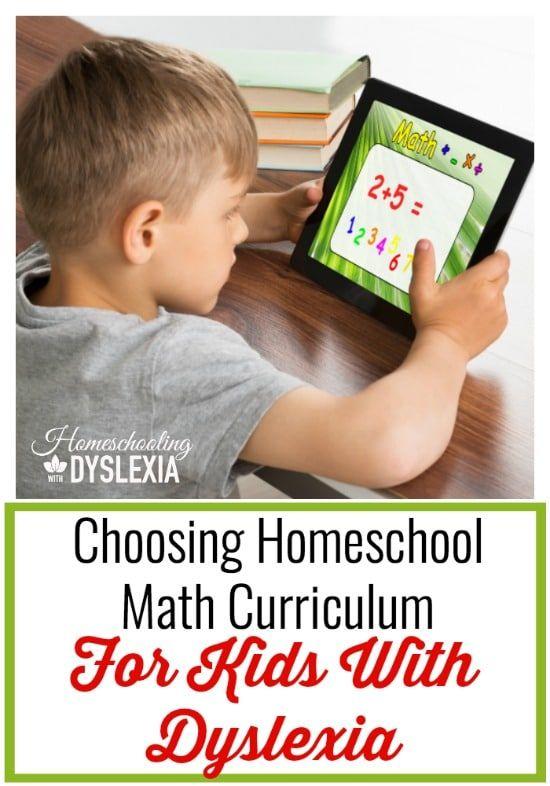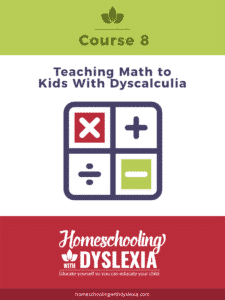If you’re planning and purchasing homeschool curriculum for kids with dyslexia, be sure to check out the first post in this series – Choosing Homeschool Curriculum: a Grade-by-Grade Guide. It is full of big-picture ideas about where to focus your priorities during different grade levels. Today we’re talking about what to consider when choosing a math curriculum for your students with dyslexia.

Choosing a Homeschool Math Curriculum
There are a few factors to think about when choosing a homeschool math curriculum for your kids with dyslexia.
Which level?
Math is pretty straight forward because most programs cover generally the same things in each grade level. If you’re just starting out or if you’re switching math programs, look for a placement test on the publisher’s web site to make sure you’re buying the correct level. Otherwise, work through your program to the end and just buy the next level.
Which type of program?
There are a LOT of math curricula out there. Like reading, I feel that it is better to have one-on-one, face-to-face teaching for math in the younger years. Kids develop the ability to think abstractly about numbers at different ages. Once our kids are able to understand number concepts, I like to switch to a computerized program so that my kids can work more independently from me.
Best Math Programs for Kids With Dyslexia
For younger kids (grades K-2):
These programs have a lot of hands-on materials and activities that help younger kids who are still thinking concretely. They can also be used for older kids if they need more of a hands-on approach.
Math U See: Basic core math curriculum. Uses base 10 manipulative blocks and continues to use other manipulatives through Algebra. Very hands on and visual.
Shiller Math: A manipulative-based math program taught with a Montessori approach. Includes a wide variety of multi-sensory activities. Does not follow typical math scope and sequence.
RightStart Math: Another very hands-on, manipulative-based math program. It is well known for using an abacus that teaches kids to visualize numbers rather than just counting them.

For Older Kids (grades 3 and up):
Teaching Textbooks: Our all-time, favorite math program, Teaching Textbooks begins in 3rd grade and goes through Pre-Calculus. A computer-based program, all lectures are offered on CD or now via online subscription. Read why using Teaching Textbooks for math is like having the good math teacher every year in my complete review here.
Other families with dyslexia have recommended:
Denison Math: For Pre-Algebra and Algebra
Mr D Math: An online program for Pre-Algebra through Trigonometry.
CTC Math: Online, for grades K-12.
What About Dyscalculia?
Some kids with dyslexia also struggle with math, also known as dyscalculia.
In general, people with dyscalculia have poor ‘number sense’.
Number sense is an intuitive understanding of how numbers work, and how to compare and estimate quantities. Number sense is at the core of math learning. Similarly to how a lack of phonemic awareness causes kids to struggle with reading, a lack of number sense causes trouble with becoming fluent with math concepts. If kids don’t understand the basics about how numbers work, learning math and using it every day can be very frustrating.
Signs of dyscalculia:
-
- Has trouble recognizing numbers and symbols.
-
- Has difficulty learning and recalling basic math facts.
-
- Struggles to identify +, ‒ and other signs and use them correctly.
-
- May still use fingers to count instead of using more sophisticated strategies.
-
- Has trouble writing numerals clearly or putting them in the correct column.
-
- Has trouble coming up with a plan to solve a math problem.
-
- Struggles to understand words related to math, such as greater than and less than.
-
- Has trouble telling his left from his right, and has a poor sense of direction.
-
- Has difficulty remembering phone numbers and game scores.
-
- Avoids playing games like Risk that involve number strategy.
- Has trouble telling time.
How to help kids with dyscalculia:
-
- Use concrete examples that connect math to real life, to strengthen your child’s number sense. Examples: sorting buttons or other familiar objects.
-
- Use visual aids when solving problems, including drawing pictures or moving around physical objects—also known as manipulatives.
-
- Assign manageable amounts of work so your child won’t feel overloaded. Break up assignments into smaller chunks, assign every other problem or sit with your child and take turns completing every other problem.
-
- Lots of review. Review recently learned skills before moving on to a new one and explaining how the skills are related.
-
- Supervise work and encourage your child to talk through the problem-solving process. Not only can this can help make sure he’s using the right math rules and formulas, it makes the process more auditory and uses another sense thereby increasing the area of the brain used to solve the problem.
-
- Break new lessons into smaller parts that easily show how different skills relate to the new concept – also known as “chunking.”
-
- Use graph paper to help keep numbers organized on the page.
-
- Use an extra piece of paper to cover up most of what’s on a math page, so your child can focus on one problem at a time.
- Playing math-related games designed to help your child have fun and feel more comfortable with math. See this huge list of math resources for games, apps, and other programs.
Learn more about Teaching Math to Kids With Dyscalculia
Find the Help Your Child With Dyscalculia Needs
In this online parent course you will learn:
- Why some kids struggle unexpectedly with math.
- What signs you may be seeing.
- The four underlying weaknesses that kids with dyscalculia have and the connection between dyslexia and dyscalculia and other learning difficulties.
- Simple teaching strategies and effective activities that can be done at home to help all students develop better math sense.
Visit the Shop for more information and to purchase this Parent Course.
Learning Math Facts
Another struggle common to kids with dyslexia (and dyscalculia) is memorizing math facts. We handle this in three ways:
- Learn strategies. Programs like Math-It (out of print but may be found on eBay) teach kids strategies for addition, and multiplication and then provide a game style way of practicing.
- Learn to skip count. There are tons of resources for teaching skip counting for learning multiplication facts. Our favorites have been from Math U See and our yearly memory work for Classical Conversations, but there are lots of songs available on YouTube.
- Use visual strategies. Use a program like Times Alive from City Creek Press that helps kids remember math facts by creating hilarious (and therefore, memorable) stories with visual aids.
To learn more about teaching math, try some of the strategies and multi-sensory activities listed in this post, Mastering Math Facts.
Math Supplements
Supplementing your core math curriculum with games, apps, and other activities can fill in gaps in our kids’ learning and can also make mastering math concepts a lot more fun. Kids who are having fun learn faster than kids who are anxious about learning.
For my top recommendations for math supplements, including games, web sites, books, manipulatives, apps, and assistive technology, see this list I compiled of 100 Best Resources for Teaching Kids Who Struggle With Math.
Other posts in this series:
Choosing Homeschool Curriculum: A Grade-by-Grade Guide
Choosing a Homeschool Math Curriculum
Choosing a Homeschool History Curriculum
Choosing a Homeschool Science Curriculum
Choosing a Homeschool Language Arts Curriculum






What is your opinion of life of Fred math curriculum? I have tried math u see accellus and Saxon and a beka and no. Have been a good fit for my dyslexic and dyscalcula children. I really appreciate your insight and help ! I have loved your reading recommendations from all about reading and spelling and reading horizons.
Life of Fred is fun but best used as a supplement. I’m glad you’re enjoying the site!!
i feel like the oddity- my 5th grader has LOVED Saxon for the last 2 years. Maybe its because she came from Abeka, when in private school. But I did use hands on items for money, fractions and percentages. we checked out math U See, CTC math and teaching textbooks and she HATED them…
tried to get her to switch, but she loves saxon…so we may stay with it til we get thru prealgebra this upcoming semester…may try Mr D for mid Algebra though…..
We really like the Math U See program. Glad to see it on your list.
I forgot to mention we also use ST Math. There’s no language involved so my kids have to figure it out on their own. It really helps with a kid with language issues.
Marianne you mentioned once that you tried Mr. D math did you have any success with it? How have your children performed on ACT/SAT test with TT as background?
For younger kids learning their addition/subtraction facts we have had great success using Preschool Prep’s Meet the Math Facts DVDs. I thought they might be too simplistic (babyish) to keep my son’s attention but he was really drawn in by the visual stories. They have samples of their videos on YouTube so you can see how your child will respond to their videos before making a purchase.
Thank you Emma!
What a blessing to find your articles and help! Our daughter (she is 12 and has mild dyslexia/dyscalculia/visual processing challenges) has used MathUSee for a few years and we have enjoyed it. She definitely still struggles with recall and learning new concepts is such a struggle. Yet, she is learning at her own pace. How can I best encourage her to keep going as she becomes easily frustrated and discouraged and we cannot continue for the day? This is our most challenging subject.
I would praise her efforts rather than the outcome.You could offer an incentive for finishing a lesson or set a timer and only work on Math for a set period of time. That may help her to relax.
Are you familiar with Math on the Level? It incorporates all the features you list as important for teaching kids with dyscalculia.
I have been enjoying reading your materials and your Facebook page, and as a homeschool mom and a former special ed teacher, I really appreciate your content.
Hi Carlita. I have not seen Math on the Level. I have heard of it though. I’m off to Google…
Hello. My twin boys who have dyslexia and dysgraphia are very behind in math. One probably has some dyscalculia because sometimes he has troubles remembering what the symbols even mean. Today we were working on multiplying decimals and he forgot to carry when adding beneath. We are have been using Math U See and are on Zeta. They are in 9th grade. We use printables with formulas to refer to and now use calculators.
Here’s the problem. Zeta doesn’t count toward credit for High School math with my evaluator in my state. My evaluator suggested skipping Pre-Algebra and going straight to Algebra 1, which doesn’t seem like a good idea for kids who struggle with math? Her thought was to do Algebra, Geometry, and then a Business Math program to get the 3 credits of HS math they need.
Looking at Math U See I don’t know if skipping Pre-Algebra would work, but looking at Teaching Textbooks it looks like there might be more review. I’m wondering if after we finish Zeta we could jump into TT Algebra.
Has anyone been in this situation? Suggestions or recommendations?
That is terrible advice! I am using Zeta and calling it General Math. In California, teens need 2 years of math one being Algebra. He will take Pre-Algebra in 10th grade and ALgebra in 11th – hopefully. You can’t skip levels of math!
I homeschool my granddaughter who has dyslexia. I have tried several math curriculums. Recently I found a great one for elementary students at Apologia. It is great!
Thanks Gail!